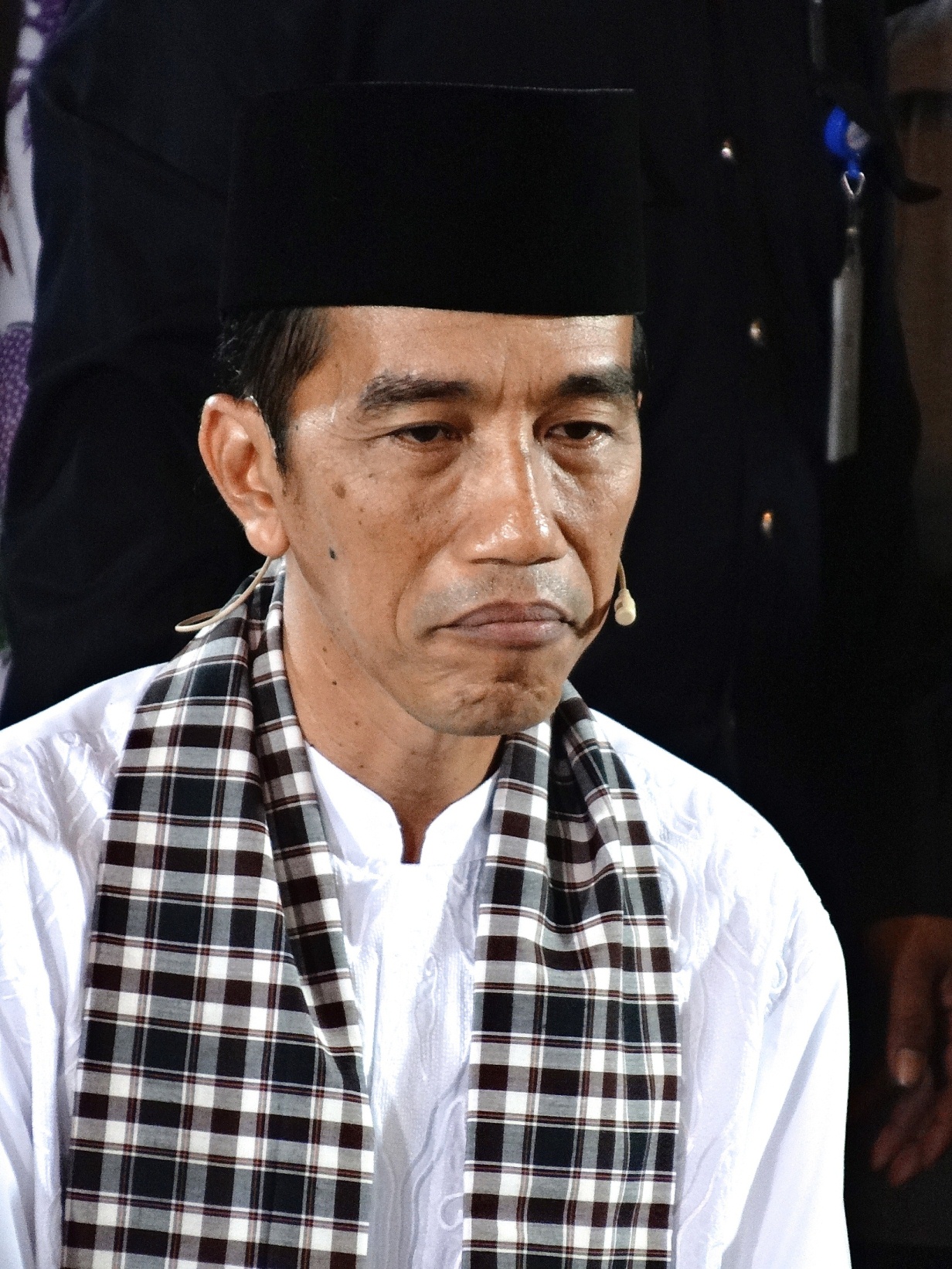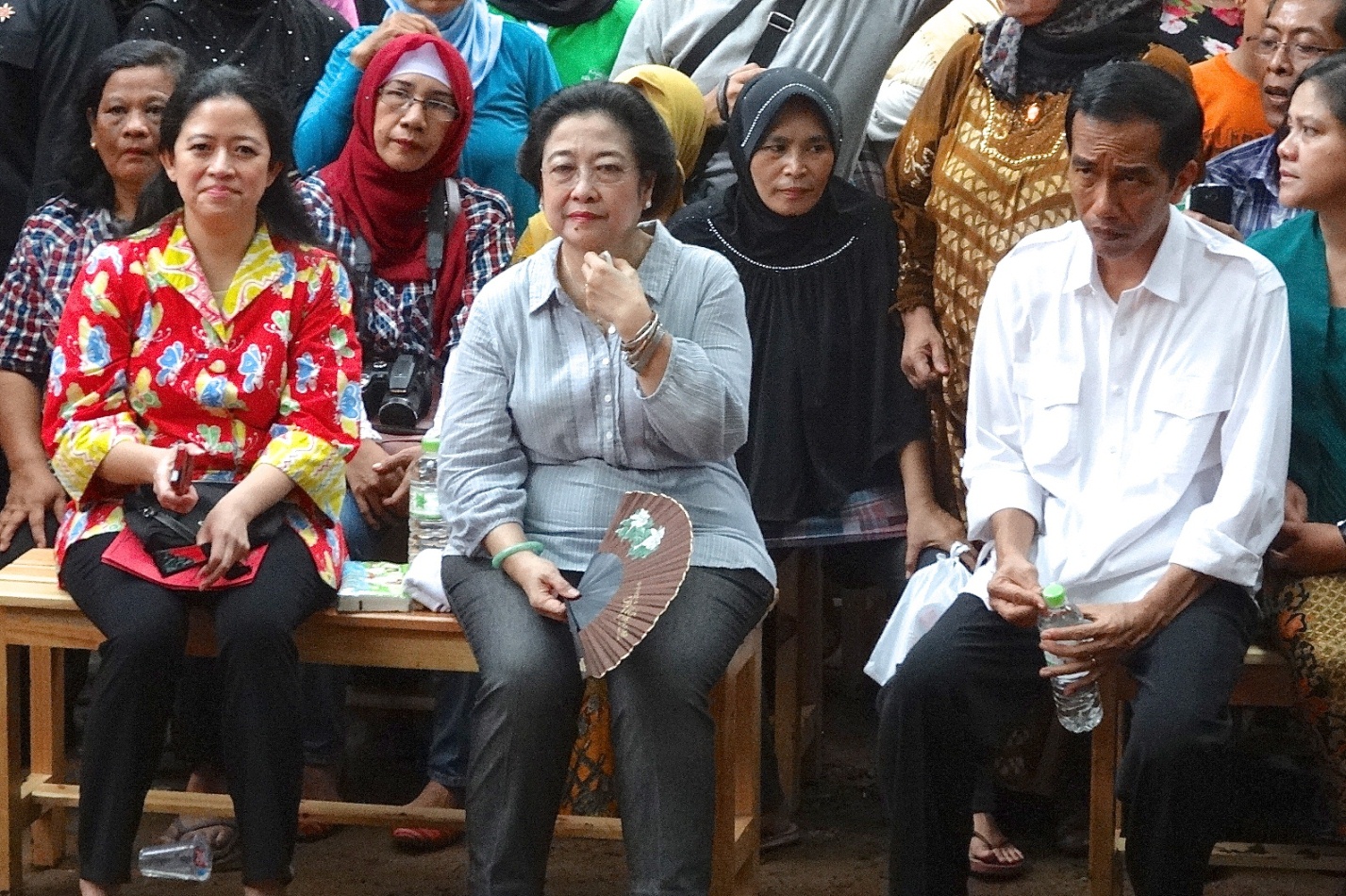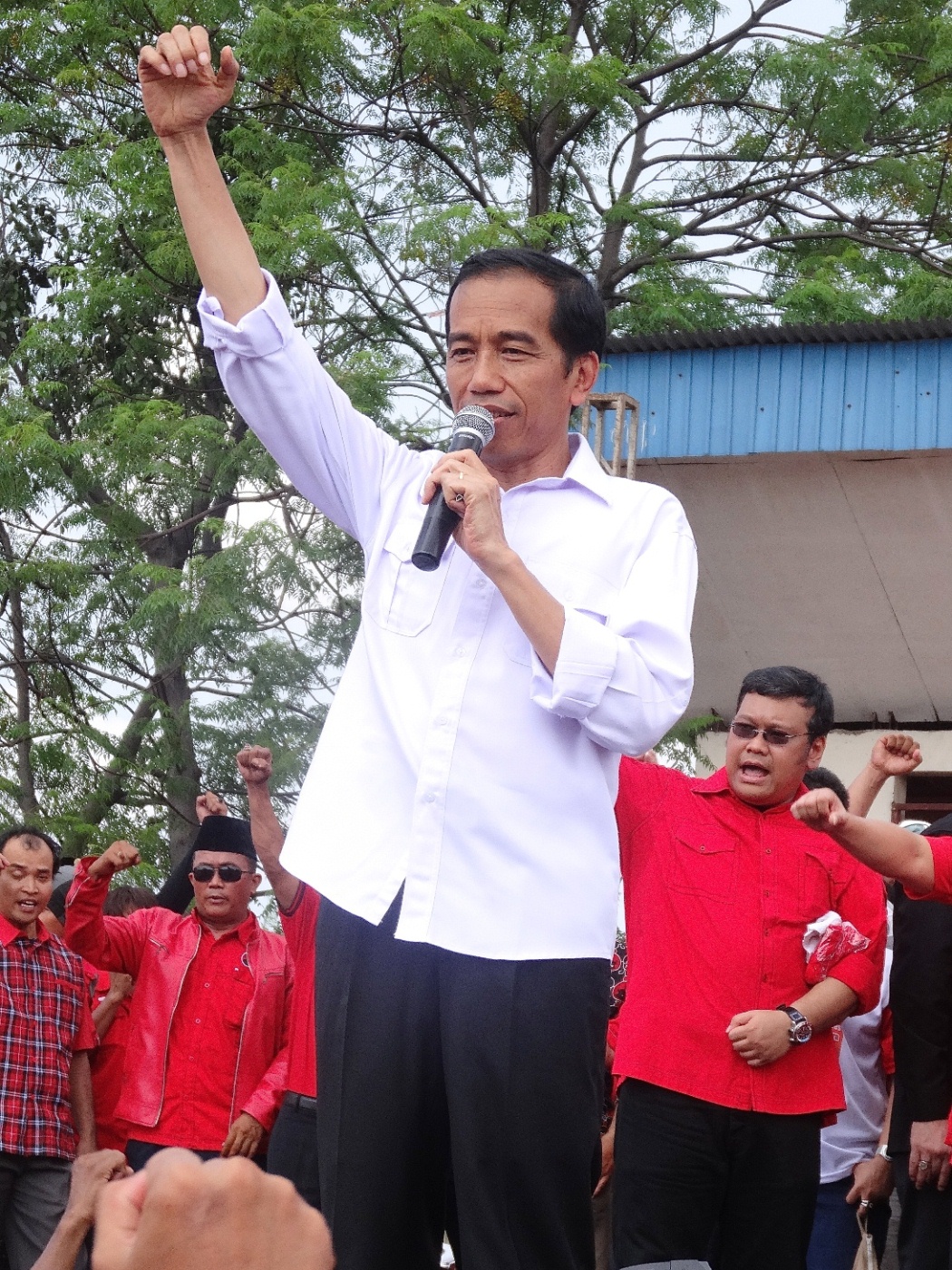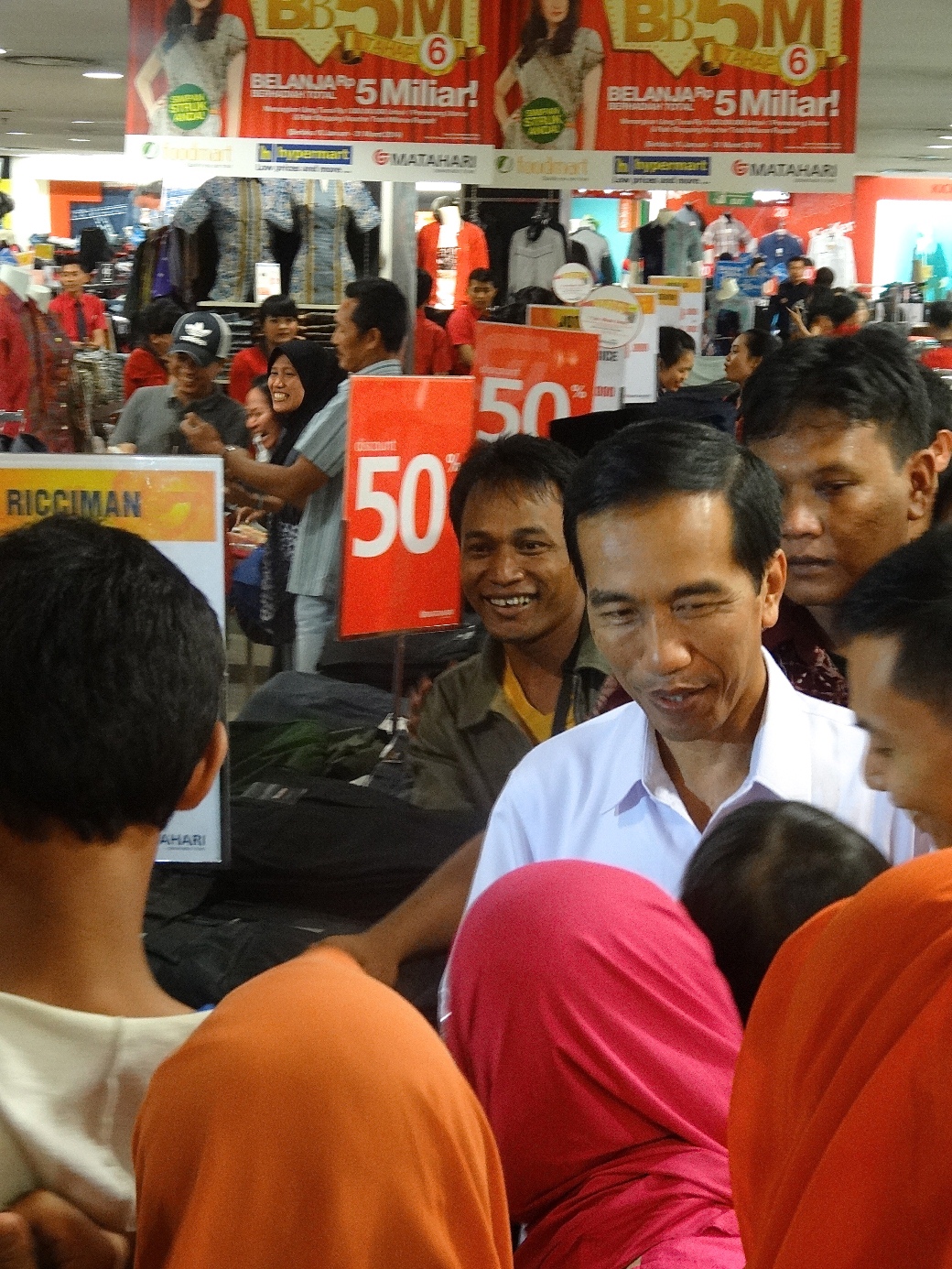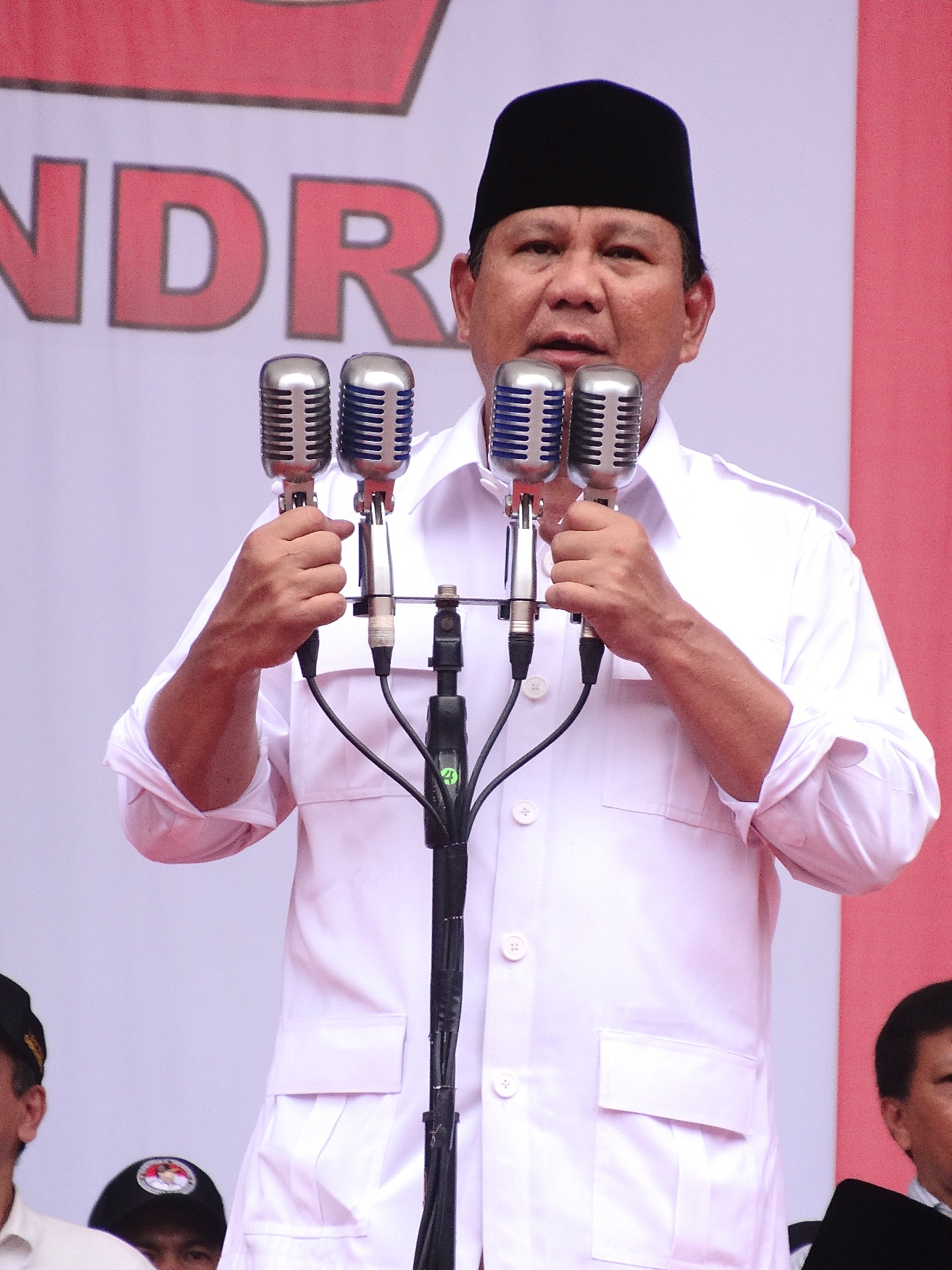Jokowi’s path to the presidency might not be as smooth as it once seemed, but he is still the front runner
Marcus Mietzner
Ever since his appearance on the national political stage in 2012, Joko Widodo (popularly referred to as Jokowi) has had an almost hypnotic impact on Indonesia’s elite and public at large. The media have followed his every word and move, and political actors were forced to redefine their strategies in anticipation of Jokowi’s expected run for the presidency. Hence, it was no surprise that Jokowi was also at the centre of Indonesia’s legislative election campaign in March and April 2014, and that discussion of the success or failure of the ‘Jokowi effect’ dominated post-election analyses.
Indeed, it has been a remarkable journey for Jokowi, transforming him from a small-town furniture entrepreneur to Indonesia’s presidential frontrunner and pop culture phenomenon. This article briefly documents his spectacular rise, but also demonstrates how complacency, strategic mistakes and infighting in PDIP and Jokowi’s circle have undermined his performance in the April elections and eroded his previously unassailable lead in the polls. While still the candidate to beat, Jokowi now faces a much tougher presidential race than he (and most observers) had imagined.
Yudhoyono’s decline, Jokowi’s rise
Jokowi’s ascent to the heights of national politics can only be explained in the context of the gradual calcification that befell Indonesian democracy during Susilo Bambang Yudhoyono’s presidency, especially in his second term. Although emerging from the 2009 elections with a strengthened popular mandate, Yudhoyono disappointed the expectations of those who had hoped he would use his final five years in office to launch a fresh wave of reforms.
Instead, Yudhoyono withdrew into the joys of ceremony and increasingly pompous speeches. At the same time, he discovered the usefulness of social media as a means to lecture his people on issues ranging from the philosophical to the banal. He also found the time to issue several musical albums – the songs on which were often played at official state functions – and he became one of the first presidents worldwide to publish a lengthy account of his rule before it had even finished.
While even close advisers agreed that Yudhoyono had become a lame duck only months into his second term, the president himself seemed unfazed by such accusations. As the notion that Indonesia was starting to experience democratic stagnation made the rounds both in the country’s political discourse and in the writings of foreign academics, Yudhoyono continued his hands-off approach to many key issues, including urgently needed bureaucratic and economic reforms.
As a result of this neglect, Yudhoyono’s popularity plummeted: from 75 per cent in November 2009, his ratings declined to 63 per cent in April 2010, 57 per cent in January 2011, 47 per cent in June 2011, 38 per cent in September 2011, and 30 per cent in May 2013. His ratings only recovered in 2014, when the attention of voters had already shifted to the candidates who would succeed him.
Significantly, Indonesia’s political parties failed to benefit from Yudhoyono’s declining popularity. Since 2004, Indonesia’s electoral system has gradually moved away from a party-based regime to a candidate-centred one, making it difficult for parties to regain the prominence they had in the early phase of the democratic transition. This trend has been reflected in the party identification (party ID) numbers, i.e. the percentage of voters who say they ‘feel close’ to a particular political party in public opinion surveys. That number was 50 per cent in 2004, but stood at a mere 15 per cent in March 2014. Moreover, with six of the nine parliamentary parties represented in cabinet, party politics was widely seen as inseparably linked to Yudhoyono’s presidency – and the blatant corruption that had engulfed it throughout his second term.
Space for a populist
In conditions of political stagnation and dissatisfaction such as these, scholars typically predict the rise of a populist who uses the frustration of the electorate with both executive and legislative leaders to assume power. In most cases, such populists appeal to the underprivileged masses by attacking a powerful ‘Other’ – preferably the rich (like in the case of Thailand’s Thaksin), foreign powers (as demonstrated by Venezuela’s Chavez) or non-native elites (Bolivia’s Morales). Indeed, it initially appeared that Indonesia would witness the rise of such a figure as well: for much of the period between late 2009 and early 2013, Prabowo Subianto – the tough-talking ex-military man and former son-in-law of long-time autocrat Suharto – was leading in the opinion polls as Yudhoyono’s preferred successor.
But while Prabowo was popular, his electoral strength remained limited. His lead in the polls was largely due to the weakness of the other contenders (most notably, former president Megawati Sukarnoputri and Golkar chairperson Abdurizal Bakrie), and voters seemed to harbour serious doubts about Prabowo’s political credibility and suitability for office. Dismissed from the military in 1998 for kidnapping anti-regime activists, Prabowo has a notoriously dark human rights record – which has led several Western countries to deny him a visa.
As an internationally connected oil magnate and a member of one of Indonesia’s richest and most powerful families, Prabowo’s pro-poor and anti-capitalist rhetoric also sounded hollow to many of the underprivileged he aimed to cultivate. Finally, there were also concerns about Prabowo’s frequent emotional outbursts, which a league of assistants tried hard to contain, and which made an increasing number of commentators worry about the prospect of a Prabowo presidency.
It was in this situation that Jokowi entered the political scene. A hugely popular mayor in his hometown of Solo in Central Java since 2005, Jokowi was known for his attention to micro-details of city governance as well as his ability to resolve difficult policy disputes through direct and tactful negotiations with community groups. With this reputation, Jokowi appeared as a more-than-obvious opposite to Yudhoyono, with his well-known aversion to handling day-to-day administrative minutiae and his often-ridiculed predilection for intellectualising and procrastination. An unimpressive speaker and more at home in simple food stalls than in debating rooms, Jokowi’s personal demeanour too couldn’t have been more different from Yudhoyono’s, which drew its spirit from protocol and formal speeches.
Equally important, however, was the fact that Jokowi was an antithesis to Prabowo as well: he carried none of the former general’s historical baggage, and unlike him, he came from humble origins. Conceptually, Jokowi was a populist too, smartly identifying what voters wanted and delivering it with great media and public relations effect. But different from Prabowo’s conventional, rabble-rousing and combative populism, Jokowi’s version was inclusive, de-escalating and unusually polite. He refused to be drawn into criticisms of the wealthy or foreign actors, emphasising instead that he worked tirelessly to solve practical problems confronting everyday people. Given these differences, it is not without irony that Jokowi would owe his meteoric entry into national politics in no small measure to Prabowo himself.
Jokowi in Jakarta
Puan, Megawati and Jokowi, November 2013 - Marcus Mietzner
Some Jakarta-based media outlets began to increasingly report on Jokowi after his overwhelming re-election in Solo in 2010 (when he received 90 per cent of the votes, an almost unheard of result in an Indonesian local election). However, his true breakthrough as a national figure only came with his nomination as governor of Jakarta in 2012. Keen to repair his image as a militarist relic of the New Order, Prabowo was looking to support popular reformers in local executive elections. Hence, Prabowo began to promote the idea of a Jokowi run in Jakarta, where the incumbent governor Fauzi Bowo appeared unbeatable despite an uninspiring first term.
Former vice-president Jusuf Kalla also advocated the idea of a Jokowi candidacy – but the key actor in the end was Megawati Sukarnoputri, chairperson of PDIP, whose approval was needed for the nomination. Jokowi was technically a PDIP cadre but had thus far shown little interest in party organisation. Against the opposition of her husband, Taufik Kiemas, Megawati eventually decided to endorse Jokowi’s nomination – a fact she would later somewhat overstate as proof of her long-standing relationship with him.
Jokowi’s victory in Jakarta – he came from behind in the polls and beat Fauzi in a second-round election in September 2012 – turned Jokowi into a national media star. Attracted by the story of a David-against-Goliath fight between the small-town, quirky and rather unpolished Jokowi and the worldly and PhD-holding Fauzi, TV stations, newspapers and online portals reported non-stop on the election in general and on Jokowi in particular. Jokowi, for his part, compounded the impact of this coverage by driving his own social media campaign.
By the end of the Jakarta contest, Indonesians had become so addicted to Jokowi stories that editors were ordered to run a certain number of news items on him each day – no matter how banal or trivial – to keep up with the ever-increasing demand. As much as the media had created the Jokowi phenomenon, it was now commercially dependent on it.
His triumph in the capital also convinced Jokowi himself that he possessed a special political talent and was therefore destined for higher office. During the 2014 legislative campaign, he would often highlight his unbeaten record in local elections (in his count, a streak of four ballots – two in Solo and then the first round and the run-off in Jakarta) as evidence that he was qualified for a presidential run. However, he prudently concealed his growing ambition, knowing that Indonesian voters preferred self-effacing humility to excessively displayed ambition.
Thus, Jokowi took office by promising to think about nothing else but Jakarta’s pressing problems: traffic congestion, floods and poor health and education services. And he went to work with incredible speed: within months of assuming power, he opened Jakarta’s public hospitals for free treatment; announced the construction of an MRT (Mass Rapid Transit) system, a project that had been delayed for decades; expanded the scholarship program for pupils from poor families; and introduced competitive online recruitment for key positions in the city bureaucracy.
His trademark, however, were his ‘blusukan’ – impromptu visits to communities and government offices in order to directly interact with the former and scrutinise the latter. Loved by citizens and feared by bureaucrats, the visits made for good publicity and had a tremendous effect. They cemented Jokowi’s image as an on-the-ground problem fixer and grassroots communicator, and instilled a constant sense of anxiety in the minds of government officials. As a result, city offices began to be fully staffed earlier in the day, services became more efficient and faster, and requests for kickbacks for simple administrative procedures declined. Jokowi also had a highly efficient deputy who ran much of the technical aspects of city governance: Basuki Tjahaja Purnama, a maverick politician of Chinese descent. Ahok, as he is commonly known, became almost as popular as Jokowi himself, particularly for scolding lazy officials and putting recordings of these dressings-down on youtube to maximize the public shaming effect.
With the media continuing its around-the clock (and almost exclusively positive) coverage, Jokowi made a spectacular entrance into the national opinion polls in early 2013. Two published polls in February showed him leading Prabowo, and most other survey institutes that didn’t announce their results detected the same seismic shift. Not since Yudhoyono’s rise in the polls in late 2003 and early 2004 had a newcomer made such an impact on presidential opinion polling in post-Suharto Indonesia. And even more importantly, in the 10-year history of professional opinion polling in the democratic polity, no leader who had emerged so suddenly or become so dominant had ever subsequently abruptly crashed and burnt. The message was clear: Jokowi was now the presidential front-runner, and he was there to stay.
The waiting game
Jokowi’s polling numbers strengthened throughout 2013, establishing a 20-per cent margin over Prabowo by the middle of the year. It was evident by now that the majority of Indonesians viewed Jokowi’s friendly populism as the more attractive alternative to Prabowo’s ultranationalist and confrontational appeal to the lower classes. But as in the case of the gubernatorial elections in Jakarta, the authority to decide on Jokowi’s nomination for the presidency rested with Megawati. While Jokowi’s inner circle debated the possibility of seeking the support of other parties, Jokowi ultimately decided that he would focus on PDIP as his nominating party. This posed two major challenges to Jokowi: first, he had to transform himself into a genuine PDIP cadre; and second, he had to gain the personal trust of Megawati.
On the campaign trail in Jakarta, March 2014 - Marcus Mietzner
Jokowi’s transformation into a PDIP icon took place throughout 2013, both visually and substantively. As mayor of Solo, his attachment to the party had been weak. Indeed, he had strongly emphasised his position as a professional administrator who stood above the fray of party politics. According to senior PDIP officials, Jokowi was first seen at a major party event in 2010, at the time of his re-election in Solo. While he was eventually installed as deputy chair of PDIP’s Central Java branch, he remained mostly inactive.
Similarly, he stated publicly prior to the Jakarta elections that he wouldn’t serve the interests of the party if elected as governor. But all of this changed in early and mid-2013: he now began to regularly attend party meetings, dressed in the PDIP’s red colours; he started to make references to party ideology and Sukarno, its founding father; and he developed networks within the party apparatus.
At the same time, Megawati sounded Jokowi out by slowly but systematically introducing him to her inner circle. She invited him to lunches and dinners, social events and weekend get-togethers, and initially refrained from raising any political issues, let alone the topic of the presidency. While these invitations cut into Jokowi’s already tight schedule as governor of Jakarta, they were crucial in deepening his relationship in Megawati – which in turn was a precondition for his nomination by PDIP.
Winning Megawati’s trust was particularly important as there was no shortage of fierce Jokowi opponents in the Sukarno family and the PDIP central board. As Jeffrey Winters has pointed out, many people around Megawati viewed him as an intruder – an unwelcome social climber who threatened the privileges of those who had worked hard for years, even decades, to reach a prominent position in the party and secure Megawati’s personal patronage. While they acknowledged that Jokowi had a much better chance of winning the presidency than any other PDIP figure (including Megawati), they were not convinced that such a victory would benefit them personally. Excluded from Jokowi’s own circle of connections, the Jokowi critics preferred being insiders in an opposition party they controlled to being outsiders in a potential government apparatus to which they had no guaranteed access.
Initially, the leader of these Jokowi opponents was Megawati’s husband Taufik Kiemas. After his death in June 2013, however, their ambitious daughter Puan Maharani assumed this role. Equipped with a strong sense of entitlement that she should be the party’s future leader, and that people who weren’t part of the Sukarno family clique should subordinate themselves to it, she watched the increasingly cosy relations between her mother and Jokowi with great suspicion. For Puan, the prospect of a Jokowi presidency did not so much offer the unexpected chance of returning PDIP to power after a decade in opposition; rather, it threatened to make Jokowi the party’s new and undisputed leader – a role Puan had envisaged for herself.
The decision is made
But there were influential pro-Jokowi forces in PDIP too. In the central board, Maruarar Sirait became the most vocal proponent of a Jokowi candidacy, using the party youth wing that he chaired to spread the word. Megawati’s son, the shy and low-profile Prananda Prabowo, was also in support. More importantly, however, the vast majority of the branches were by mid-2013 convinced that a Jokowi candidacy would not only give them a realistic shot at the presidency, but would also increase the chances of local PDIP politicians gaining seats in the legislative elections. At a party meeting in Jakarta in September 2013, branch leaders left the party leadership in no doubt that they wanted Megawati to nominate Jokowi sooner rather than later.
Torn between the pro- and anti-Jokowi groups in her party – both of which fed her information that supported their respective causes – Megawati decided to set up an independent team to advise her on the matter. Her long-time friend Cornelis Lay, a respected academic, put together a group of scholars, activists and party functionaries that operated outside of the central board and reported directly to Megawati. Known as the Team of 11, the group looked at the available polling data, discussed multiple scenarios, and developed political and ideological criteria for the party’s nominee. Despite a last-minute push by Megawati loyalists in late 2013 and early 2014 that proposed a Megawati run with Jokowi as her deputy, the team concluded by February that Jokowi should be the nominee. When Megawati was told of this conclusion, she nodded in agreement.
For the public, however, the waiting game continued. While she had made up her mind, Megawati was concerned that a premature announcement of Jokowi as the party’s presidential candidate would make PDIP functionaries and legislative nominees complacent. She also feared that it would open the floodgates for a wave of attacks on Jokowi by other presidential contenders and their allies. As it would turn out, these fears were well founded. But Jokowi’s supporters – who had argued that he should have been nominated in January at the latest – pushed for a speedy announcement. In their view, Jokowi was much more valuable to PDIP’s legislative campaign as the official nominee than as a stand-by candidate. But it was only a sharp decline in the polling numbers for PDIP and Jokowi in March (which the party interpreted as increasing public dissatisfaction over Jokowi’s unclear status) that persuaded Megawati to give in: on 14 March, two days before the start of the parliamentary campaign, she proclaimed Jokowi as the party’s nominee.
Blusukan in a mall, Lampung, March 2014 - Marcus Mietzner
The campaign
Jokowi entered the parliamentary campaign as the most popular presidential candidate, and his party was set to win the legislative poll as well. In a poll taken by the Indikator institute shortly before and after the beginning of the campaign, PDIP was at 24.5 per cent, and Jokowi would have won a three-way presidential race with 56 per cent against Prabowo’s 20 and Abdurizal Bakrie’s 9 per cent. But these numbers declined as the campaign progressed. A poll taken towards the end of the campaign by Saiful Mujani Research and Consulting (SMRC) found PDIP was at 21 per cent, while Jokowi stood at 52 per cent versus Prabowo’s 23 and Bakrie’s 11 per cent. On voting day, several quick counts ranked PDIP first with around 19 per cent of the votes, while SRMC’s exit polls discovered that 43 per cent of voters would have opted for Jokowi, 27 for Prabowo and 13 for Bakrie. Two days after the elections, another SMRC poll established that the gap between Jokowi and Prabowo had closed even further.
This raises the question of what had happened during the campaign, which ran from 16 March to 5 April. Had Indonesians suddenly radicalised and turned towards the iron-fisted populist promising to free Indonesia from foreign enslavement instead of the soft-spoken pragmatist they had fallen in love with little more than a year ago? Hardly. But PDIP, and Jokowi personally, had run a lacklustre and disjointed campaign, while their opponents – most notably Prabowo – had rolled out their full armoury and used it effectively.
Inexplicably, the Jokowi campaign decided very early on that their candidate would not address any issues related to policy, arguing that this would only be done during the presidential elections. Thus, Jokowi’s short campaign speeches contained little else than calls on voters to support PDIP and be vigilant about electoral fraud. Throughout the campaign, there was no reference to the reasons why Jokowi wanted (and Indonesia needed him) to be president. Instead, Jokowi went on his much-loved blusukan in every city he visited, and while he created a riot wherever he appeared, these ‘small talk with the people’ events failed to give the campaign an overarching theme.
Ironically, the decision not to talk about policy issues was one of the very few subjects that the various groups in the PDIP election apparatus could agree on. Otherwise, intra-party disagreement and lack of coordination were the most common features of the campaign. There were at least three teams trying to determine the strategy, location and scheduling of Jokowi’s campaign: first, Puan Maharani’s Electoral Success Board (Bapilu); second, the PDIP team seconded to Jokowi, headed by Andi Widjajanto, a University of Indonesia academic and son of the late PDIP grandee Theo Syafei; and third, Jokowi’s own network of assistants, which included confidants from his time as mayor of Solo. In addition, there were countless volunteer groups, social media teams and local support networks.
The most divisive issue between the various fractions in PDIP’s campaign was the extent to which Jokowi should be used as the focus of the party’s television advertisements. Prior to the announcement of Jokowi as the presidential nominee, Puan had developed a series of ads under the slogan ‘Terrific Indonesia’ (Indonesia Hebat). Initially conceptualised as a campaign to highlight PDIP’s many successful governors, mayors and regents, Puan had ultimately tailored the campaign around herself. After Jokowi’s declaration, Puan refused to change the party’s advertising strategy, apparently hoping that regular and nationwide commercials featuring her would lift her own poor popularity ratings. Jokowi suggested very early in the campaign that the advertisements needed to highlight him in order to have the desired effect. Puan only gave in to this demand in the third week of the campaign – but party officials close to Jokowi had to collect money from non-party sources in order to pay for the new ads.
Opposing Jokowi
While PDIP was in disarray, its opponents ran highly effective anti-Jokowi campaigns. Prabowo in particular portrayed Jokowi as a Megawati puppet and policy lightweight – an attack that the PDIP machinery had helped to lend credence to by not allowing Jokowi to talk about policies. And after one and a half years of favourable press coverage, those party leaders who owned TV stations (Surya Paloh of Nasdem, Golkar’s Bakrie, and Hary Tanoesoedibjo of Hanura) ordered their editors to limit reporting on Jokowi’s campaign events to a minimum and instead start digging up negative stories.
Prabowo in the Bung Karno stadium, March 2014 - Marcus Mietzner
Once again, PDIP and Jokowi assisted their opponents in these attacks: even journalists from politically neutral media outlets reduced their reporting on Jokowi, given that his campaign speeches gave them nothing new to report. As one journalist – a Jokowi fan – reported from the campaign trail, ‘we are all bored to tears and have no idea what to write about; it’s all the same’.
Prabowo, by contrast, turned the campaign into a series of professionally choreographed events. At its climax, during an hour-long speech at Jakarta’s Bung Karno stadium, he laid out the pillars of his populist, anti-foreign and testosterone-driven worldview. Having arrived at the stadium in a helicopter and reviewing a paramilitary parade while riding on a horse, he gave the impression of a man not only willing but desperately determined to rule. While liberal Indonesians and foreign observers were horrified, and comparisons with Mussolini made the rounds, many ordinary citizens were strangely fascinated by this display of power and will. Arguably, Jokowi’s refusal to offer any insights into his programmatic, ideological and personal motivation to seek the presidency had created a political vacuum that Prabowo was more than happy to invade.
All the while, PDIP kept raising expectations of an overwhelming victory, possibly meeting or even exceeding the party’s 1999 result of 34 per cent. In his speeches, Jokowi talked about the need to ‘win big’, saying that anything other than a compelling result would not allow him to rule effectively. In the party’s and Jokowi’s projections, they mostly referred to experimental polling that had asked voters whether they would vote for PDIP if Jokowi was the nominee. Of course, no such association was made on the actual ballot paper – thus, the results of up to 37 per cent were purely hypothetical. PDIP’s internal polling in the last week of the campaign saw the party at 32 per cent, and although Jokowi’s personal pollsters warned that the result would be closer to 20, the party continued to talk up its chances.
Expectations awry
It was therefore not only the media’s, but also the party’s, fault, that the result of 19 per cent was widely perceived as a devastating defeat. In fact, PDIP had won an Indonesian parliamentary election for the first time since 1999; it held a 5 per cent margin over the second-placed party, Golkar; and it was ahead in 15 provinces, up from the four provinces it had held in 2009.
Experienced spin-doctors would have known how to present this as a terrific comeback for a party that many observers had declared clinically dead years ago. They also would have known how to credit Jokowi for this result, pointing out that even Yudhoyono never got his Democratic Party above 21 per cent. Instead, PDI-P officials went on television on election night, declaring with a grim face that the party ‘accepted’ the outcome. Jokowi also expressed ‘disappointment’ with the result, helping the media to develop a narrative centred on the alleged end of Jokowi’s legendary electoral invincibility.
Overall, the parliamentary elections marked Jokowi’s arrival in the ugly lowlands of Indonesian day-to-day politics. Gone are the days in which he could sail from one opinion poll record to the next without having to confront the complexities of elite machinations, internal factionalism, smear campaigns and antagonistic debates. The message to Jokowi from the legislative elections (and the post-election opinion polls on his personal popularity) is loud and clear: while most Indonesians still prefer his soft populism to Prabowo’s brutal rhetoric, they want to know what he would do with the presidency – and they want to know it now.
They also want him to show determination – not necessarily the theatrical staging of overbearing leadership ambitions that Prabowo put on during the campaign, but simply a compelling indication that he really wants to be president, and that he’s ready to fight for it. The presidency, then, remains Jokowi’s to lose, but the campaign and its aftermath have also shown that losing is no longer an impossibility.
Marcus Mietzner (marcus.mietzner@anu.edu.au) researches Indonesian politics at the Australian National University.

